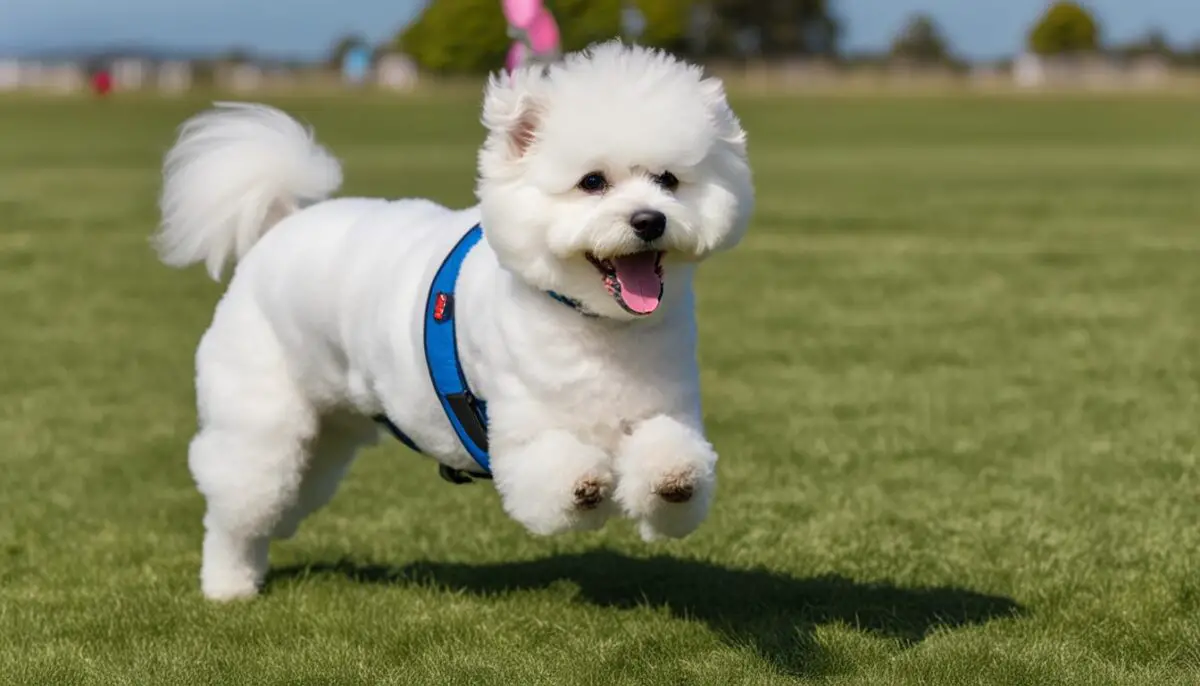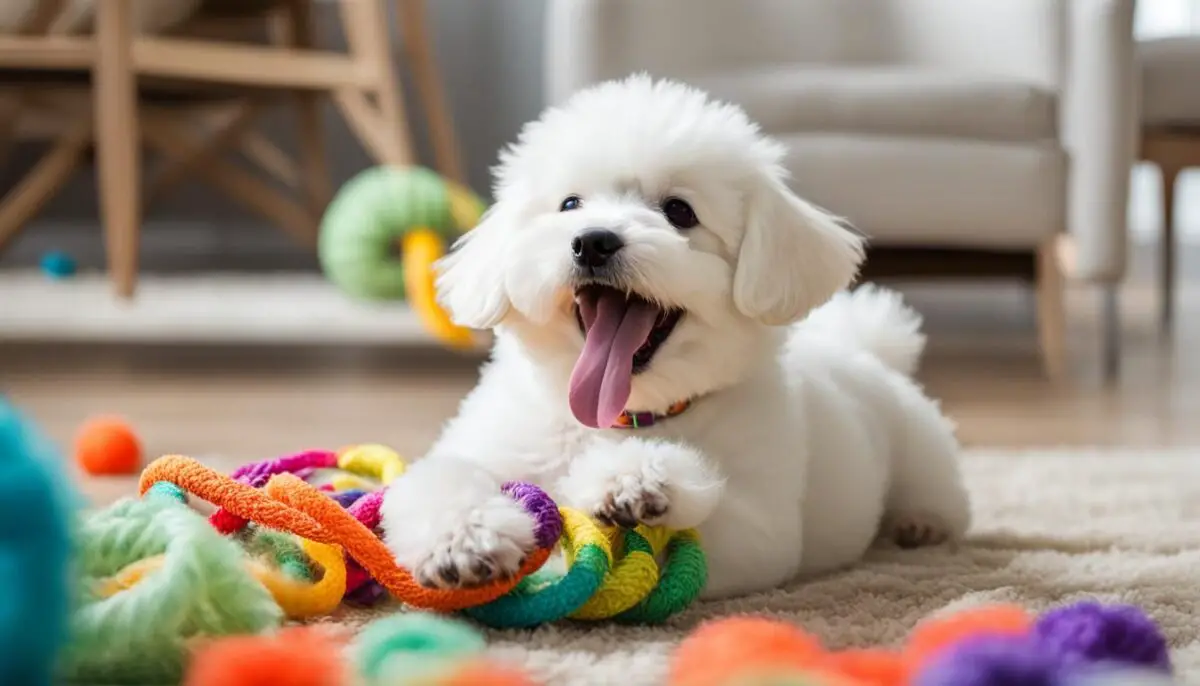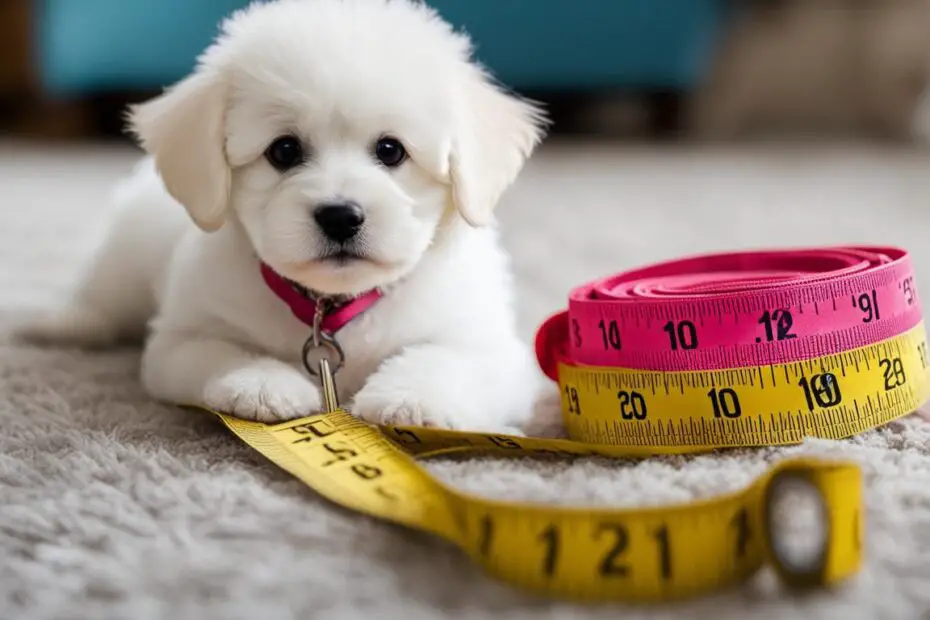The Bichon Frise is a small dog breed known for its cheerful and playful nature. In this comprehensive guide, we will explore the weight and height patterns of Bichon Frises, providing you with valuable insights into their growth. Whether you are a new Bichon Frise owner or simply interested in learning more about this delightful breed, this guide will help you understand the factors that influence their size and offer guidance for their optimal care.
It’s important to note that Bichon Frises have an average weight range of 10-18 pounds and a height of 10-12 inches at the shoulder. Their size may vary within these ranges depending on factors such as genetics, diet, and overall health. By understanding the growth patterns of Bichon Frises, you can ensure that you provide them with the appropriate care and create a nurturing environment for their development.
Key Takeaways:
- Bichon Frises have an average weight range of 10-18 pounds and a height of 10-12 inches at the shoulder.
- Proper care and a balanced diet are essential for the healthy growth of Bichon Frises.
- Regular grooming is necessary to maintain their fluffy white coat.
- Bichon Frises are generally healthy but can be prone to allergies, ear infections, and dental problems.
- Choosing a reputable breeder and providing regular veterinary check-ups are crucial for their well-being.
Bichon Frise Weight and Height
Understanding Bichon Frise Growth: Male Weights and Heights by Age
As your male Bichon Frise puppy grows, you may be curious about how his weight and height will develop. Understanding the average growth patterns can give you a better idea of what to expect. Here is a breakdown of the average weights and heights of male Bichon Frises at different stages of their growth: Bichon Frise Weight and Height
| Age | Average Weight | Average Height |
|---|---|---|
| Birth | 0.4-0.7 pounds | 2-3 inches |
| 3 years | 13-18 pounds | 11-12 inches |
Please note that these figures represent average measurements and individual male Bichon Frises may vary. Consulting with a veterinarian who can assess your specific dog’s growth is always recommended. They can provide you with more accurate information based on your Bichon Frise’s unique characteristics and health. Bichon Frise size
By monitoring your Bichon Frise’s growth and ensuring proper care, you can help your furry friend thrive during this important stage of development.
Understanding Bichon Frise Growth: Female Weights and Heights by Age
Female Bichon Frises, like their male counterparts, experience growth patterns that vary at different stages of their development. It’s important to track their weight and height to ensure they are growing properly. Here is a breakdown of average weights and heights for female Bichon Frises at various ages:
| Age | Weight Range | Height Range |
|---|---|---|
| Birth | 0.35-0.6 pounds | 2-3 inches |
| 3 months | 2-4 pounds | 4-6 inches |
| 6 months | 5-9 pounds | 6-8 inches |
| 1 year | 8-12 pounds | 9-10 inches |
| 3 years | 11-16 pounds | 9.5-11 inches |
Please note that these are average ranges, and individual female Bichon Frises may deviate from these numbers. Consulting with a veterinarian is recommended for personalized growth information. Monitoring the weight and height of your Bichon Frise throughout their developmental stages will help ensure they are healthy and thriving. Bichon Frise average weight
Proper nutrition is also crucial for their growth. Providing a balanced diet and following feeding guidelines based on their age and weight will support their development. Additionally, regular grooming and healthcare are essential to maintain their well-being. By creating a safe and stimulating environment, socializing them with others, and building a strong bond through training and affection, you can ensure your growing Bichon Frise leads a happy and healthy life.
Feeding and Nutrition for Growing Bichon Frises
Proper nutrition plays a vital role in the healthy growth and development of Bichon Frises. From puppyhood to adulthood, providing them with a balanced diet is essential.
During the first six months of a Bichon Frise’s life, it’s recommended to feed them three times a day using high-quality puppy food. This ensures that they receive the necessary nutrients for their rapid growth. After six months, transitioning to twice daily feeding is common. bichon frise average height
Consulting with a veterinarian is crucial to determine the appropriate feeding guidelines based on your Bichon Frise’s age and weight. They will provide you with specific recommendations tailored to your dog’s needs. bichon frise height range
Table: Bichon Frise Feeding Recommendations
| Age | Feeding Frequency | Recommended Food |
|---|---|---|
| Puppy (up to 6 months) | 3 times a day | High-quality puppy food |
| Adolescent (6 to 12 months) | 2 times a day | High-quality puppy food or transition to adult food |
| Adult (12 months and older) | 2 times a day | High-quality adult dog food |
Remember, maintaining a healthy weight is important to prevent obesity, which can lead to various health problems. Regular exercise and portion control can help ensure your Bichon Frise maintains a healthy body condition.
Grooming and Coat Care for Growing Bichon Frises
Bichon Frises have a curly coat that requires regular grooming to keep it healthy and tangle-free. Here are some essential grooming tips to ensure your Bichon Frise looks and feels their best: bichon frise weight range
Grooming Routine:
- Brush their coat every other day to prevent matting and tangles. Use a slicker brush or a comb with wide-spaced teeth to gently remove any knots or debris.
- Professional grooming is recommended every 4-6 weeks to maintain their coat’s health and appearance. A professional groomer will trim their hair, clean their ears, trim their nails, and ensure their coat is properly maintained.
- Bichon Frises may start developing their adult curly coat around 7-9 months of age. It’s important to establish a regular grooming routine early on to keep their coat in good condition.
Bathing and Drying:
Bathing your Bichon Frise once every 4-6 weeks is usually sufficient. Use a gentle dog shampoo that is specifically formulated for their sensitive skin. After bathing, thoroughly dry their coat to prevent any moisture from getting trapped, which can lead to skin irritations or infections.
Coat Trimming:
Regular coat trimming is necessary to maintain the Bichon Frise’s signature fluffy appearance. Pay attention to the hair around their eyes, ears, paws, and sanitary areas. These areas tend to accumulate dirt and can easily become matted if not properly trimmed.

By following these grooming tips and establishing a regular routine, you can keep your Bichon Frise’s coat healthy, shiny, and free from tangles. Regular grooming not only keeps them looking their best but also contributes to their overall well-being. bichon frise size chart
Health Considerations for Growing Bichon Frises
When it comes to the health of your growing Bichon Frise, there are a few key considerations to keep in mind. While Bichon Frises are generally healthy dogs, they can be prone to certain health issues, including allergies, ear infections, and dental problems. It’s important to stay vigilant and provide regular veterinary check-ups to monitor their health and address any potential issues. bichon frise weight and height guidelines
One common health concern for Bichon Frises is allergies. These can manifest as skin irritations, itching, and even respiratory symptoms. It’s important to identify and manage any allergies your Bichon Frise may have, whether it’s related to food, environmental factors, or other triggers. Your veterinarian can help determine the cause of the allergies and provide guidance on the best course of treatment.
Bichon Frises are also prone to ear infections, which can be caused by their floppy ears trapping moisture and bacteria. Regular ear cleaning and inspection are essential to prevent infections. Your veterinarian can show you how to properly clean your Bichon Frise’s ears and recommend any necessary ear care products.
In addition to allergies and ear infections, dental problems can also affect Bichon Frises. Small dog breeds like Bichon Frises are prone to dental issues such as tartar buildup, gum disease, and tooth decay. Regular brushing and dental care can help prevent these problems. Your veterinarian can guide you on proper dental care techniques and may recommend professional dental cleanings as needed.
Table: Common Health Issues for Bichon Frises
| Health Issue | Symptoms | Treatment |
|---|---|---|
| Allergies | Skin irritations, itching, respiratory symptoms | Identification of triggers, management, and possibly medication |
| Ear Infections | Redness, discharge, head shaking, odor | Regular cleaning, inspection, and possibly medication |
| Dental Problems | Tartar buildup, gum disease, tooth decay | Regular brushing, dental care, professional cleanings |
It’s crucial to take a proactive approach to your Bichon Frise’s health. This includes regular veterinary check-ups, maintaining an optimal weight, providing a balanced diet, and practicing good grooming and dental care routines. By staying informed and addressing any health concerns in a timely manner, you can help ensure the overall well-being of your growing Bichon Frise.
Training and Socialization for Growing Bichon Frises
Training and socialization are crucial aspects of raising a Bichon Frise puppy. These intelligent and highly trainable dogs thrive when provided with consistent training and positive reinforcement. By starting early and focusing on key behaviors, you can help your Bichon Frise become a well-behaved and well-adjusted adult.
Basic Obedience Training
Begin training your Bichon Frise as early as 8 weeks old. Start with basic commands such as sit, stay, come, and down. Use positive reinforcement techniques like treats, praise, and rewards to motivate your puppy. Keep training sessions short and fun to maintain their attention and enthusiasm. Consistency is key, so practice these commands regularly to reinforce good behavior. bichon frise weight and height standards
Puppy Classes and Socialization
Enrolling your Bichon Frise in puppy training classes is an excellent way to socialize them with other dogs and people. These classes offer a controlled environment where your puppy can learn and interact with others. Socialization is vital for a Bichon Frise’s development, as it helps them become comfortable and confident in various situations. Expose your puppy to different environments, sounds, and experiences to prevent fearfulness or anxiety.
Addressing Behavior Issues
Like any dog, Bichon Frises may develop behavior issues such as excessive barking, separation anxiety, or inappropriate chewing. Consistent training, positive reinforcement, and early intervention are key to addressing these challenges. Patience, understanding, and seeking guidance from a professional dog trainer can help you overcome these behavior issues and ensure a happy and harmonious relationship with your Bichon Frise.
| Training Tips: | Socialization Tips: |
|---|---|
|
|
Remember, training and socialization are ongoing processes. As your Bichon Frise grows, continue to reinforce their training and expose them to new experiences. This will help them develop into happy, well-behaved adult dogs that can fully enjoy a wide range of activities and environments.

Providing a Safe and Stimulating Environment for Growing Bichon Frises
Creating a safe and stimulating environment is crucial for the well-being and development of your growing Bichon Frise. They are energetic and playful dogs that require plenty of mental and physical stimulation to thrive. By incorporating playtime, exercise, and mental enrichment into their daily routine, you can ensure that your Bichon Frise remains happy and healthy.
Playtime
Bichon Frises love to play and interact with their owners. Set aside dedicated playtime every day to engage with your furry friend. Whether it’s a game of fetch, tug-of-war, or hide-and-seek, interactive play sessions provide physical exercise and mental stimulation. It’s important to choose toys that are appropriate for their size and breed, ensuring they are safe and durable.
Exercise
Regular exercise is vital for Bichon Frises to maintain a healthy weight and prevent behavioral issues that may arise from pent-up energy. Daily walks are great for providing both physical and mental stimulation. Aim for 30 minutes to an hour of exercise per day, but keep in mind your Bichon Frise’s age, health, and energy levels. It’s always a good idea to consult with your veterinarian to determine the best exercise regimen for your furry companion.
Mental Stimulation
Bichon Frises are intelligent dogs that thrive on mental challenges. Providing them with activities that engage their minds can prevent boredom and destructive behaviors. Puzzle toys, treat-dispensing toys, and interactive games can keep your Bichon Frise mentally sharp. Training sessions are also an excellent way to stimulate their minds while reinforcing good behavior and obedience.
| Activities for Mental Stimulation | Description |
|---|---|
| Nose work | Hide treats or toys around the house or yard for your Bichon Frise to sniff out. |
| Training sessions | Teach your Bichon Frise new tricks and commands using positive reinforcement techniques. |
| Interactive toys | Provide puzzle toys and treat-dispensing toys that require problem-solving skills. |
| Scent games | Introduce scents and encourage your Bichon Frise to identify and find specific scents. |
Creating a safe and stimulating environment for your growing Bichon Frise involves incorporating playtime, exercise, and mental stimulation into their daily routine. By providing opportunities for physical activity and mental challenges, you can ensure that your furry friend remains happy, healthy, and well-adjusted.

The Joys of Growing with a Bichon Frise: Building a Strong Bond
Bichon Frises are more than just a pet; they are loyal and loving companions who become an integral part of your family. Their affectionate nature makes them excellent family dogs, bringing joy and happiness to everyone around them.
These furry friends form strong bonds with their owners and are always there to provide comfort and support. Whether you’re feeling down or in need of a pick-me-up, a Bichon Frise’s warm heart and wagging tail can brighten even the gloomiest of days.
One of the greatest joys of growing with a Bichon Frise is the unwavering loyalty they show. They will always be by your side, ready to offer their love and companionship. Whether you’re going for a walk, playing in the park, or simply relaxing at home, your Bichon Frise will be right there with you, cherishing every moment spent together.
Quotes
“Having a Bichon Frise in our family has been an amazing experience. Their affectionate nature and loyalty make them the perfect companion for both adults and children.”
– Jane, proud Bichon Frise owner
In Summary
- Bichon Frises are affectionate and loyal companions, forming strong bonds with their owners.
- Their warm hearts and wagging tails bring joy and love to their families.
- Bichon Frises are known for their unwavering loyalty and will always be by your side.
- Building a strong bond with your Bichon Frise is a rewarding and fulfilling experience.
Table: Benefits of Growing with a Bichon Frise
| Benefits | Explanation |
|---|---|
| Loyalty | Bichon Frises are incredibly loyal and devoted to their owners. |
| Affection | Their affectionate nature brings love and warmth to your life. |
| Family Dog | Bichon Frises are excellent family dogs, fitting in seamlessly with your household. |
| Companionship | Having a Bichon Frise by your side provides constant companionship and emotional support. |
Conclusion
In conclusion, understanding the growth patterns of Bichon Frises is essential for providing proper care and nurturing their development. By being aware of their average weight and height at different stages of growth, you can ensure that your Bichon Frise is on track for a healthy and happy life. Remember, these are just averages, and individual dogs may vary, so it’s always best to consult with a veterinarian for specific information about your Bichon Frise’s growth.
Feeding your Bichon Frise a balanced diet is crucial for their growth and development. As they transition from puppyhood to adulthood, it’s important to adjust their feeding schedule and portions accordingly. Regular grooming is also necessary to keep their curly coat in good condition and prevent matting. Professional grooming appointments every 4-6 weeks can help maintain their coat’s health and appearance.
Health considerations play a vital role in ensuring the well-being of your growing Bichon Frise. Regular veterinary check-ups and addressing any potential health issues are crucial. Maintaining their optimal weight and providing proper care can help prevent growth-related health problems. Training and socialization are essential for their mental and behavioral development. Starting early with positive reinforcement techniques and exposing them to various environments and interactions will help them become well-adjusted and obedient adults.
Providing a safe and stimulating environment is key to a happy Bichon Frise. Regular exercise, mental stimulation, and a comfortable living space are all important factors in their overall well-being. By building a strong bond and showering them with love and attention, you can create a lifelong connection with your Bichon Frise and enjoy the joys that come with having this affectionate and loyal breed as part of your family.
FAQ
What is the average weight and height of a Bichon Frise?
The average weight of a Bichon Frise is 10-18 pounds, and the average height at the shoulder is 10-12 inches.
Where does the Bichon Frise breed originate from?
The Bichon Frise breed originated in the Mediterranean region.
What is the grooming requirement for a Bichon Frise?
Bichon Frises have a fluffy white coat that requires regular grooming, including brushing every other day and professional grooming every 4-6 weeks.
What are some health issues that Bichon Frises can be prone to?
Bichon Frises can be prone to allergies, ear infections, and dental problems.
How often should a Bichon Frise puppy be fed?
For the first six months, it’s recommended to feed a Bichon puppy three times a day. After six months, transitioning to twice daily feeding is common.
At what age does a Bichon Frise start developing its adult curly coat?
Bichon Frises may start developing their adult curly coat around 7-9 months of age.
How often should I take my Bichon Frise for veterinary check-ups?
Regular veterinary check-ups are essential to monitor their health. Consult with a veterinarian for specific guidelines.
When should I start training my Bichon Frise puppy?
Bichon Frise puppies can begin basic obedience training as early as 8 weeks old.
How much exercise does a Bichon Frise need?
Bichon Frises enjoy daily walks and interactive play sessions. Providing plenty of mental stimulation is also important.
Are Bichon Frises good family dogs?
Yes, Bichon Frises are known for their affectionate and loyal nature and make excellent family dogs.

